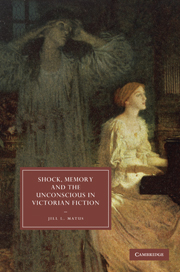Book contents
- Frontmatter
- Contents
- Acknowledgements
- Introduction: the psyche in pain
- 1 Historicizing trauma
- 2 Dream and trance: Gaskell's North and South as a “condition-of-consciousness” novel
- 3 Memory and aftermath: from Dickens's “The Signalman” to The Mystery of Edwin Drood
- 4 Overwhelming emotion and psychic shock in George Eliot's The Lifted Veil and Daniel Deronda
- 5 Dissociation and multiple selves: memory, Myers and Stevenson's “shilling shocker”
- Afterword on afterwards
- Notes
- Selected bibliography
- Index
- CAMBRIDGE STUDIES IN NINETEENTH-CENTURY LITERATURE AND CULTURE
2 - Dream and trance: Gaskell's North and South as a “condition-of-consciousness” novel
Published online by Cambridge University Press: 30 January 2010
- Frontmatter
- Contents
- Acknowledgements
- Introduction: the psyche in pain
- 1 Historicizing trauma
- 2 Dream and trance: Gaskell's North and South as a “condition-of-consciousness” novel
- 3 Memory and aftermath: from Dickens's “The Signalman” to The Mystery of Edwin Drood
- 4 Overwhelming emotion and psychic shock in George Eliot's The Lifted Veil and Daniel Deronda
- 5 Dissociation and multiple selves: memory, Myers and Stevenson's “shilling shocker”
- Afterword on afterwards
- Notes
- Selected bibliography
- Index
- CAMBRIDGE STUDIES IN NINETEENTH-CENTURY LITERATURE AND CULTURE
Summary
One of my mes is, I do believe, a true Christian – (only people call her socialist and communist), another of my mes is a wife and mother, and highly delighted at the delight of everyone else in the house … Now that's my “social” self I suppose. Then again I've another self with a full taste for beauty and convenience whh is pleased on its own account. How am I to reconcile all these warring members? I try to drownmyself (my first self,) by saying it's Wm who is to decide on all these things and his feeling it right ought to be my rule, And so it is – only that does not quite do.
Gaskell to Eliza Fox 1850As a social problem novel, or a novel of industrial life, North and South has traditionally received much critical attention for its purchase on questions of political economy and the relations of labor and capital. It is also, I will argue in this chapter, a novel with a sustained focus on interiority and consciousness. From the opening pages, where Margaret Hale, now a stately girl of eighteen and about to leave her aunt's home, recalls her early “wild passion of grief” at being separated from her parents, the narrative pays close attention to painful feelings – their expression, censorship and transformative potential. More specifically, North and South is interested in the effect of very powerful feelings on psychic functioning and in the haunting aftermath of intense emotional experience.
- Type
- Chapter
- Information
- Shock, Memory and the Unconscious in Victorian Fiction , pp. 61 - 82Publisher: Cambridge University PressPrint publication year: 2009



